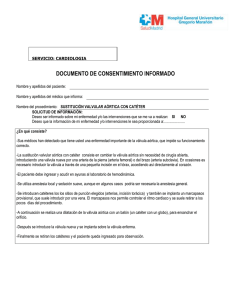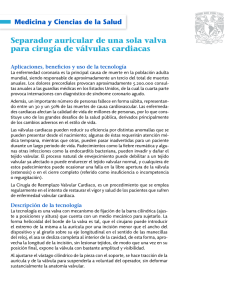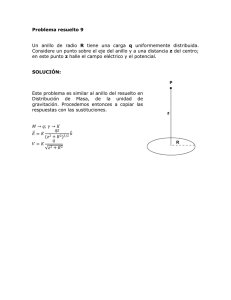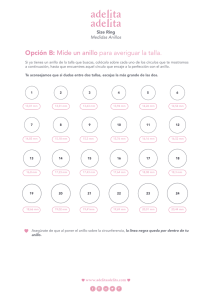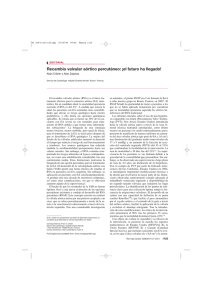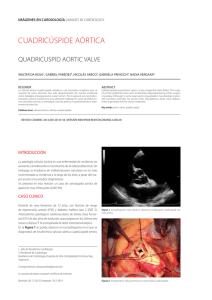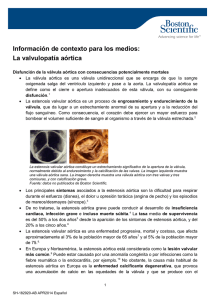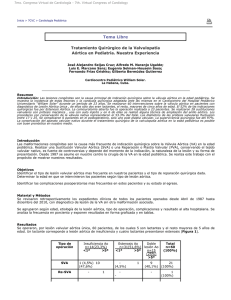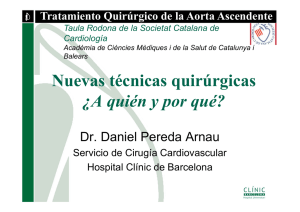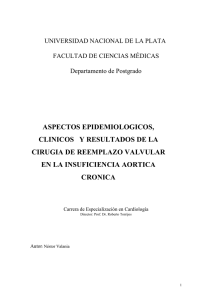Reemplazo Valvular Aórtico Percutáneo
Anuncio
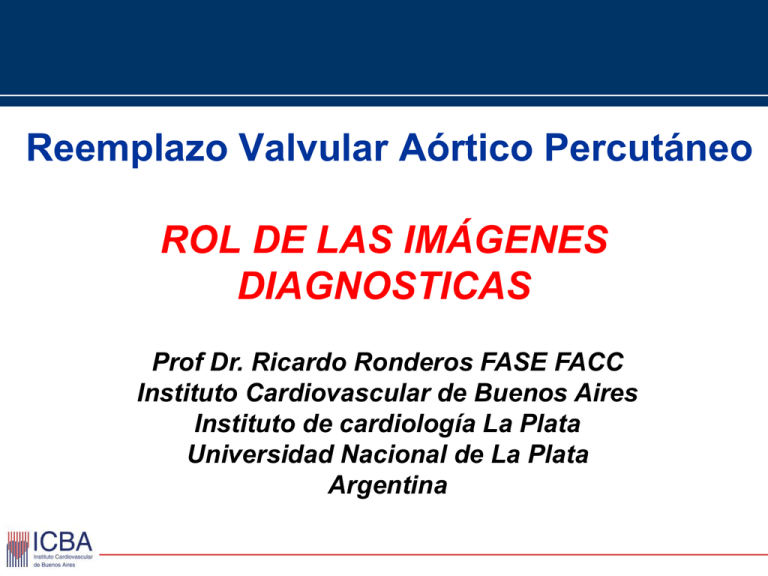
Reemplazo Valvular Aórtico Percutáneo ROL DE LAS IMÁGENES DIAGNOSTICAS Prof Dr. Ricardo Ronderos FASE FACC Instituto Cardiovascular de Buenos Aires Instituto de cardiología La Plata Universidad Nacional de La Plata Argentina FISIOPATOLOGIA DE LA DEGENERACION DE LA VALVULA AORTICA OWENS and OTTO JACC imag 2009 EXPECTATIVA DE VIDA MEDIA EN ARGENTINA MUJERES HOMBRES Años 80 75 70 65 72,5 años 60 90-95 95-00 00-05 79,5 años 2005-10 2010-15 FUENTE INDEC 2010 Evolución de la estenosis aórtica 1.S.J Lester et al.Chest 1998 Cuadro: Ross J Jr, Braunwald Aortic Stenosis Circulation CRITERIOS DE SEVERIDAD EAE/ASE RECOMENDACIONES EN E AO Baumgartner et al. European Journal of Echocardiography (2009) 10, 1–25 ACC/AHA Surgical Indications in Aortic Stenosis Circulation 2006; 114: 84-231 40% de pacientes estan subtratados Porcentaje de pacientes con estenosis aórtica severa sintomatica tratados NO CRV Aortica CRV Aortica Alternativas Terapeúticas Historia Natural Estenosis Aórtica TRATAMIENTO MEDICO CIRUGÍA Valvuloplastia RVAP Varadarajan et al. Ann Thorac Surg 2006; 82:2111-5. Alternativas Terapeúticas MORTALIDAD REEMPLAZO VALVULAR AORTICO EFECTO DE LA EDAD CIRUGÍA Burr at al. Annal of Thor Surg 1995,60;S264-269 PRONOSTICO E AORTICA ASINTOMATICA, BIAS Death cardiac causes Surgery 9,8% Medical treat 30,5% Asymptomatic surgery survival 72% Asymptomatic medical survival 43% Mortality 12 % / year Pellika P et al Circulation 2005 GUIAS ACC/AHA 2006 Consideraciones en ancianos • Ancianos con E Aórtica asintomática tienen PEOR evolución que los más jóvenes • Desarrollan dilatación VI o síntomas antes que los jóvenes • Persisten con disfunción VI o con síntomas postcirugía con mas frecuencia • Peores tasas de sobrevida postoperatoria • Asintomáticos u oligosintomáticos deben ser candidatos a cirugía pues mejora su pronóstico Bonow R et al JACC 2006; 48:1-148 CASOS CLINICOS CASO 1 89 años, masculino Dislipemia Antecedentes Heredofam.(+) COMORBILIDADES: ACE CFI/II con lesión severa DA CASOS CLINICOS CASO 1 2004: Dg de EAo severa Sintomático (síncope) Se negó a CRV 08/2009: EAP + disnea CF III/IV+ síncope Medicación: - Furosemida 40 mg - Espironolactona 25 mg - Trimetazidina 35 mg c/12hs - Atorvastatina 20 mg - AAS 100 mg CASO 1 CASO 1 • Válvula Tricúspide con severa calcificación del anillo • Area Valvular Aórtica: 0.37 cm2 (planimetría) y 0.73cm2ecuación continuidad CASOS CLINICOS CASO 1 2004: Dg de EAo severa Sintomático (síncope) Se negó a CRV 08/2009: EAP + disnea CF III/IV+ síncope EUROSCORE Mortalidad: 14,65 % STS SCORE Mortalidad: 4% Morb-mortalidad 24.8% CASOS CLINICOS CASO 1 ? Reemplazo Valvular Percutáneo Dispositivos Actuales Edwards ~ 5000 pacientes CoreValve ~ 5000 pacientes Válvula Autoexpandible •Stent de Nitinol •Areas de diferente fuerza radial: •Area de Baja Fuerza Radial que permite orientar el Sistema. • Expansión Restringida en el área coronaria. • Alta Fuerza Radial que provee un anclaje efectivo y una fuerza constante que reduce el leak paravalvular. Selección del Paciente CARDIÓLOGOS INTERVENCIONISTAS CARDIÓLOGOS CLÍNICOS CIRUJANOS CARDIOVASCULARES EQUIPO MULTIDISCIPLINARIO ESPECIALISTAS EN IMAGENES ANESTESIÓLOGOS ELECTROFISIÓLOGOS Patients selection- 4 steps 1. 2. 3. 4. Confirmation Ao Stenosis Clinical evaluation Surgical risk, expectancy of life. Assessment of feasibility of procedure Importance of multimodality imaging assesment Contraindicaciones generales • Anillo Aortico • < 20mm o >27mm • Válvula Bicúspide • Calcificación muy severa de la válvula • Fuga paravalvular • Marcapaso definitivo • Aorta ascendente > 45mm • Para Autoexpandibles • Inaccesibilidad por enfermedad vascular periferica (femoral o subclavia) Estudios para la selección del paciente • Cinecoronariografía + Aortograma • • • • Enfermedad coronaria Distancia entre anillo-orígenes coronarios Angulación VI-Aorta y cayado aortico Enfermedad de la aorta ascendente y descendente • Mediciones de anillo aortico y función ventricular • Ecocardiograma, angiografía, multislice TAC o angioRMN • Acceso vascular: dimensiones de los vasos ilio-femoral (o subclavio), enfermedad, tortuosidad y calcificación • Angiografía • Multislice TC • Angio resonancia Caso MTF • Válvula Tricúspide con severa calcificación del anillo • Anillo valvular aórtico 25 mm • Aorta ascendente 36mm INTRAPROCEDIMIENTO Area 0,6 cm2 Aortic Annulus size • TTE underestimate compared with TEE • Both potentially underestimation true/full Ao annulus diameter. • Aortic Root complex 3D anatomy and the base (annulus) often is eliptical: – MSCT, MRI, 3D Echo: allows 3D, multiplanar reconstruction of Ao annulus->best accuracy and better definition of eliptical shape. Forma del anillo aortico CT Imaging of the Aortic Root Standard MSCT diameter measurements A sagital section of the root and the distance between the annulus and Left Coronary sinus A sagital section of the root and the level of the annulus, sinus of Valsalva, and sinotubular junction (STJ) are shown. Diametros anillo Ao corte axial ETE 3 D CORRELACION ENTRE MEDIDAS TCMS ECO TRANSESOFAGICO Minimum (Dmin) Oblique sagittal plane: TTE parasternal long-axis view, TEE: mid-oesophageal long-axis view This view corresponds with the manufacturer’s guideline of sizing Maximum (Dmax) Oblique coronal plane approximates the postero-anterior view on cine-angiography (implanter’s view) ‘Mean’ Mean (Dmean) (Dmin – Dmax)/2 from circumference (Dcirc) ‘Mean’ from CSA (DCSA) Schultz et al, Euro Heart Journal, 2009 Exact Location and Severity of Aortic Valve Calcification Midly calcified AoV. small isolated spots Moderate calcified AoV, > at base of the leaflets. Heavily calcified AoV, > at the tips of the leaflets. •incomplete or nonuniform expansion . LOCALIZACIÓN DEL CALCIO Noble S. Bonan R. et al Eurointervention 2009;1:5, 78-86 Evaluar acceso femoral o subclavia OTRAS EVALUACIONES Procedimiento híbrido Procedimiento Valvuloplastia con marcapaseo 180 x min Técnica: una liberación lenta, permite el reposicionamiento Previo al Contacto Anular Post Contacto Anular Antes de la Liberacion de la válvula No need to “rush” since… Posicionamiento e implante valvular INTRAPROCEDIMIENTO INTRAPROCEDIMIENTO INTRAPROCEDIMIENTO INTRAPROCEDIMIENTO INTRAPROCEDIMIENTO INTRAPROCEDIMIENTO INTRAPROCEDIMIENTO INTRAPROCEDIMIENTO Reemplazo Valvular Percutáneo COMPLICACIONES VASCULARES MARCAPASOS PERMANENTE FUGA PERIVALVULAR Perforación, disección, oclusión TAPONAMIENTO RUPTURA DEL ANILLO MIGRACION DE PROTESIS FRECUENCIA y SEVERIDAD I AO CRITERIOS DE SEVERIDAD I AO CONTROL 30 DIAS Control Alejado CONTROL 30 DIAS Control alta y 2 meses CONTROL 30 DIAS MSCT after PAVR MSCT evaluation in 30pts at a median 1.5 months after percutaneous aortic valve replacement Axial dimensions and apposition of the CRS were evaluated at 4 levels: • MSCT demonstrated incomplete and nonuniform expansion of the CRS frame, but the functionally important midsegment was well expanded and almost symmetrical. • Undersizing and incomplete apposition were seen in the majority of patients Schultz et al. JACC , 2009 CONTROL 30 DIAS SEGUIMIENTO PARTNER PARTNER TAVI vs RVAO MORTALIDAD e I AO MORTALIDAD SEGUN SEVERIDAD DE I AO Conclusiones • No hay un verdadero gold standard • Todas las modalidades de imágenes tienen limitaciones, aunque e trascendente el uso de modalidades 3D ( TCMS, RM o Eco 3D) • La identificacion de causas de complicaciones relacionadas con la válvula en ensayos clínicos en gran escala mejorara sin duda la capacidad de elección de candidatos
